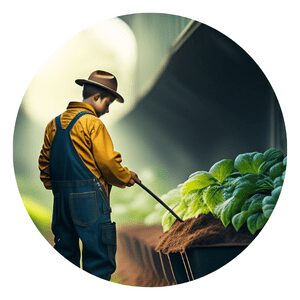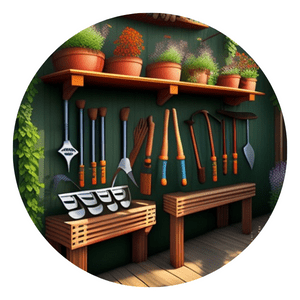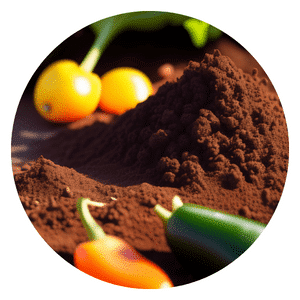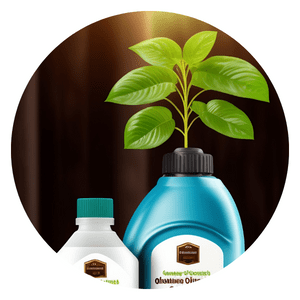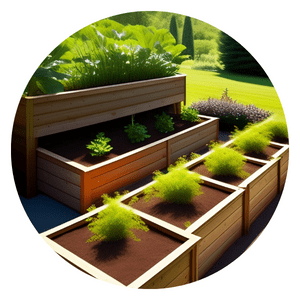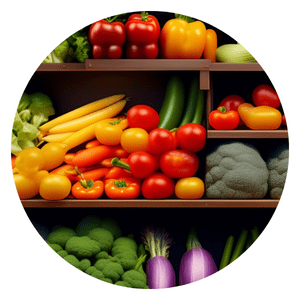Companion Planting with Pepper
Companion planting is a fantastic way of naturally increasing the health and yield of your pepper plants.
When done correctly, companion planting can be an effective and sustainable way to improve the overall quality of your garden.
By carefully selecting certain plants to grow alongside peppers, you can create a thriving and diverse ecosystem in your garden that will provide numerous benefits for your pepper plants.
Pepper is an incredibly versatile plant that pairs well with many different types of companions.
Table of Contents
Basil: A Perfect Match for Peppers
Basil is one of the most popular companion plants for peppers.
This herb provides a number of benefits to pepper plants, including repelling pests and attracting beneficial insects like bees and butterflies.
Basil also releases essential oils that can help mask the scent of peppers, making them less attractive to harmful bugs.
In addition to its pest-repelling properties, basil can also enhance the flavor of peppers when used in cooking.
The sweet yet slightly spicy taste of basil perfectly complements the heat and tanginess of peppers, creating a delicious balance of flavors in any dish.
Whether you’re making stir-fry, soup or salsa, adding some fresh basil leaves will elevate your recipe to new heights.
Growing basil alongside your pepper plants is easy and can be done in both outdoor gardens or indoor planters.
Simply plant your basil seeds or seedlings next to your pepper plants, water regularly and enjoy the many benefits this fragrant herb has to offer!
Beets: Enhancing Pepper Growth Naturally
Beets are a great companion plant for peppers as they complement each other’s growth and provide natural benefits to the soil.
Beets have high levels of boron, which help promote pepper growth by improving cell wall structure and enhancing calcium uptake.
Additionally, beets have deep roots that help to loosen up soil, allowing water and nutrients to penetrate more easily.
Planting beets alongside peppers also helps to deter common pests such as aphids and spider mites. These pests are attracted to the sweet scent of peppers but can be repelled by the strong earthy smell of beets.
Furthermore, planting these two vegetables together can create a mutually beneficial micro-environment where both plants can thrive.
To maximize this effect, it is recommended to plant beet seeds directly in-between pepper plants or in alternating rows.
By doing so, you will not only improve your pepper crop but also enjoy a delicious harvest of nutrient-packed beets at the same time!
Brussels Sprouts: Providing Shade and Protection
Brussels sprouts are a great companion plant for peppers in your garden.
Not only do they add visual interest and diversity to your vegetable patch, but they also provide shade and protection for your pepper plants.
The tall, leafy stalks of Brussels sprouts can shelter the more delicate pepper plants from harsh sunlight and wind.
This shading effect can be particularly beneficial during the summer months when temperatures climb, and direct sunlight can scorch young pepper plants.
Additionally, Brussels sprouts have a naturally strong scent that can help repel common pests like aphids or whiteflies from attacking pepper plants.
Overall, planting Brussels sprouts alongside peppers is a smart strategy that enhances the health of both crops while promoting biodiversity in your garden.
By providing shade and protection to your peppers, Brussels sprouts create an optimal growing environment that will yield healthy yields come harvest time.
Softly once the first green pepper sprouts I need some carefully selected companions, no doubts. Tomatoes and onion, carrots, beets and herbs, Provide three season’s colors; purple, red , green and blurbs. Corn for the summer will help in its growth like a tutor, Gives nitrogen to the soil; really adds more roots’ splendor. Cucumbers and squash nearby it do belong, To protect sweet peppers from pests they’re strong. Bean varieties bring forth an extra flavor boost, Lovely companions with which our peppers doth roost!
Chappy The Gardener
Chives: Pest Protection for Peppers
Chives, a herbaceous plant, are known for their ability to deter pests in the garden.
When planted with peppers, they can act as a natural pest repellent and protect them from harmful insects that could damage or destroy the plants.
Chives contain sulfur compounds that repel many common garden pests like aphids, spider mites, and Japanese beetles.
Apart from being a natural pest protection solution for pepper plants, chives have other benefits as well. They add an extra layer of flavor to recipes and blend well with peppers in dishes like stir-fries and salads.
Additionally, chives attract beneficial insects like bees and butterflies which help in pollination of your pepper plants.
To make the most out of companion planting with chives and peppers, it is important to plant them in close proximity.
You can also try interplanting them by alternating rows or creating small clusters throughout your garden bed.
Doing so will not only help keep pests at bay but also create a visually appealing garden bed full of wholesome herbs and veggies!
Eggplant: Companions for Pest Control
Eggplant is a versatile plant that can be grown in many environments.
One of the lesser-known benefits of growing eggplants alongside peppers is their natural pest control properties.
Eggplants are known to repel whiteflies, which are a common pest for peppers.
By planting eggplants nearby, you can create a natural barrier that will help protect your pepper plants from these pests.
Another benefit of planting eggplant alongside pepper plants is their ability to attract beneficial insects like ladybugs, lacewings and hoverflies.
These insects feed on aphids, which are another common pest that can damage pepper plants.
By attracting these beneficial insects to your garden, you can reduce the need for chemical pesticides while also improving the overall health of your garden.
Finally, eggplants and pepper plants have similar soil requirements and complement each other well when it comes to nutrient uptake. This means that they can be grown together without competing for resources or causing any harm to one another.
Overall, planting eggplant alongside pepper plants is a great way to improve the health and productivity of your garden while also reducing the need for harmful chemicals and pesticides.
Garlic: Natural Pest Repellent
Garlic is a natural pest repellent that can be used in companion planting with pepper.
Garlic contains sulfur compounds that give it a strong scent, which can repel many pests, including aphids and spider mites.
By planting garlic around your pepper plants, you can create a natural barrier against these insects.
Garlic also has antibacterial properties that can help protect your pepper plants from disease.
When planted nearby, the garlic will release compounds into the soil that inhibit the growth of harmful bacteria and fungi. This can reduce the risk of plant diseases like root rot and wilt.
In addition to its pest-repelling and antibacterial properties, garlic is easy to grow and requires little maintenance.
Simply plant cloves in well-draining soil and water regularly.
During harvest season, you’ll have fresh garlic to use in your cooking while also protecting your pepper plants from pests and disease.
Green Beans: Supportive Companions for Peppers
Green beans are a great companion plant for peppers because they help improve soil health, prevent erosion, and attract beneficial insects such as bees.
They also add nitrogen to the soil, which is essential for pepper plants’ growth.
Beans are legumes that have the ability to fix atmospheric nitrogen into a form that can be used by other plants.
Green beans grow quickly and create a canopy that shades the soil and helps retain moisture, making it easier for pepper plants to grow in hot weather conditions.
Additionally, green beans do not compete with pepper plants for nutrients since they have different nutrient requirements.
This makes them excellent companions for peppers since both can thrive well together without any competition.
Planting green beans alongside peppers has many benefits that enhance overall garden productivity while reducing pest problems.
With proper care and attention given to each crop’s growth requirements, you’re sure to enjoy an abundant harvest of healthy vegetables in your garden year-round.
Onion: Pest Deterrent and Disease Fighter
The pungent smell of onion can help in deterring common pests that attack pepper plants such as aphids, spider mites, and thrips.
These insects find the smell of onions unpleasant and prefer to stay away from it.
Planting onions around the pepper beds is an effective way to keep these pests at bay.
Onions also have antibacterial properties that make them effective in fighting some plant diseases.
The juice extracted from onions has been found to be effective in controlling damping-off disease which affects young seedlings, especially in damp conditions.
Onions are also known to inhibit the growth of fungal spores which cause powdery mildew on leaves.
When planting onions as a companion crop for peppers, it is important to ensure that they are planted at least 6 inches away from each other so that they don’t compete for nutrients and water.
Moreover, you should avoid planting onions too close to beans or peas since these crops do not thrive well when grown together due to their different nutrient requirements.
In summary, incorporating onion into your pepper bed can help control pests and diseases while enhancing the overall health of your plants.
In conclusion, companion planting with peppers is a great way to maximize garden space and pest management.
By planting the right combination of plants together, a gardener can do their part in creating a healthy garden environment.
While there are many plants that can be grown alongside peppers, some of the best options include basil, beans, oregano, onions, and marigolds.
It’s also important to remember to provide peppers with plenty of air circulation and adequate water for optimal growth.
Click To Grow
Helps Us Grow – Share If You Like


